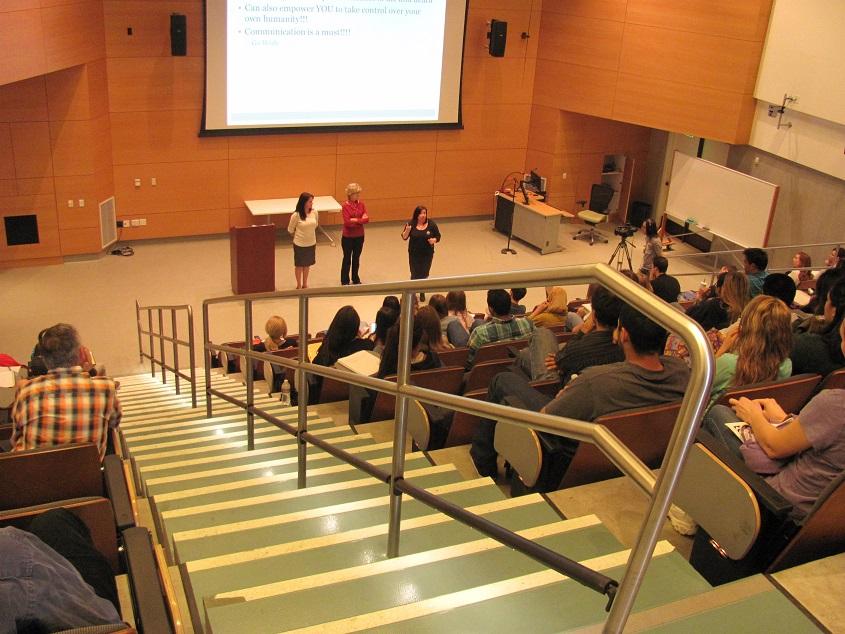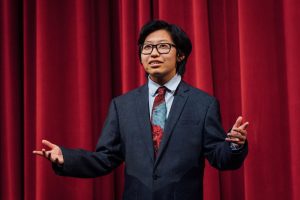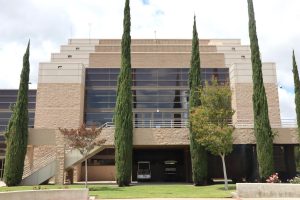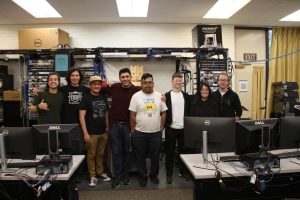Recent lecture offered insight into technology’s effect on the heart, mind, and brain
Psychology professors Nadia Monosov, Margaret Tennat, and Julie Campbell answer questions from the audience at their lecture.
March 16, 2014
The lecture was a three-part speech done by psychology professors Nadia Monosov, Margaret Temant, and Julie Campbell. They all discussed the effects that technology is having on the mind, both in life and in death.
The lecture began with Psychology Professor Nadia Monosov’s take on multi-tasking and whether or not it could make someone a better student.
Multi-tasking involves doing more than two things at the same time and switching between them in rapid succession. With most of today’s youth being heavy users of technology, they tend to multi-task frequently, says Monosov.
“86 percent of individuals use their smartphones while preforming other activities,” said Monosov. “So are we getting better at multi-tasking?”
Even with years of multi-tasking the brain cannot adapt to be better at it. Monosov compares our attention to a spot light, with a very limited capacity to focus on everything around us. The more stimuli you have the less attention you are actually using.
Mulit-tasking also increases stress, inhibits creativity, drops a person’s IQ by ten points (at the moment of multi-tasking), and impairs students’ academics.
According to Monosov, multi-tasking should only be done when doing two familiar tasks, such as running and listening to music, but should not be done when doing two unfamiliar tasks, such as texting and driving.
Mososov ended her lecture with a quote by Publilius Syrus, which states, “To do two things at once is to do neither.”
The second part of the lecture was run by psychology professor Margaret Temant, who showed off the growing research that video games, contrary to popular belief, are beneficial.
Temant began by reminding the audience how popular video games are. She goes on to ask a question that she explained psychologists are eager to find out.
“With all the time we spend on video games, what’s going on in our brains?” asks Temant. “Are we getting better, or are we getting worse?”
Although it is a common idea that video games have negative effects on the brain, there’s a lot of research that implies there are positive effects on the mind. In fact, good things may be going on in the brain as a result of playing games in as much or as little as an hour a day, says Temant.
There are different types of games, but they are all the same because of a common factor: interaction. That may be the most important part, says Temant, if a game is fun and interactive it can also be beneficial.
Temant also talked about four areas of the brain that research is finding to be benefited by video games. Those domains are cognitive, emotional, motivational, and social.
Cognitively, games help allocate focus, improve visual acuity, and improve special reasoning. Games also promote problem solving and boost creativity. Emotionally, games manage moods and stress, create positive feelings, and manage negative emotion. Motivationally, games create a sense of self improvement and reward. Socially, games create pro social skills, civic engagement, and social decision making.
The future of what video games can do for the mind is still a growing subject, says Temant, and the research has merely just begun.
Campbell went straight to the point with the third part of the lecture, asking the question: Is technology changing our conception of death?
Vital signs determine death, however today it’s more complex than just checking for a pulse, says Campbell. Advances in medical technology can keep people alive, but at what extent of keeping vitals going does someone consider you alive?
Campbell discusses the various ways that someone can be pronounced dead, and the controversy of what constitutes death and when is it okay to interfere.
For some, if a machine was what was keeping the blood flowing through your body, they would not consider themselves alive, says Campbell. However that is not enough for others, since if the higher brain is still functioning they would consider themselves alive.
Campbell also spoke about organ donation, and how the controversy over whether or not someone is dead or not affects it.
“If we are going to be harvesting organs, we need to be very clear on what is dead and what is alive,” says Campbell.
Campbell defines a few ways that people are determined dead, one being if there is irreversible cessation of circulatory and respiratory functions and another being irreversible cessation of brain stem control.
Campbell ends by talking about the personal choice in the matter; whether or not you would want to be hooked up to a machine or simply let nature take its course. It all requires forethought.
“You need to think about, when would I say no more,” says Campbell. “Even if my society considers me alive, would I consider me alive?”
It’s a scary thing to talk about with family, says Campbell, but it’s something that we need to try and think about.
The lectures held the attention of the audience and the subject were very relative to many of the students.
“This is something thats not really talked about” said 20-year-old student Andrew Brown, a psychology major. “Hearing differing opinions was both shocking and enlightening.”
This lecture was a part of the year-long discussion in the Year of Technology and Humanity. For information on any future events or lectures, keep in touch with StudentVoiceOnline.com.






